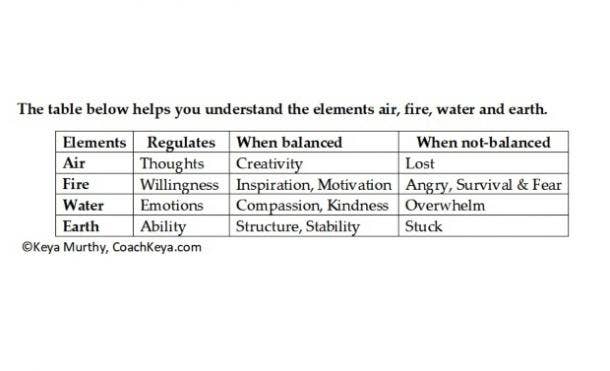The 2-Pronged Process To Balance Your Water Element & Stop Feeling Overwhelmed
Feeling overwhelmed is a stress response that greatly affects your mental health. But, did you know that learning how to stop feeling overwhelmed is a two-pronged process?
It's achieved by quick fixes and prevention through lifestyle management.
As an Ayurvedic counselor and an empath, I know the way to stop feeling overwhelmed all the time is by balancing the water element.
Feeling overwhelmed used to be a natural state of existence for me and it still is, to a great extent, but I've learned to manage through the feelings of stress, emotional burden, and the sensation of drowning.
The first prong in learning how to stop feeling overwhelmed is taking part in daily exercises.
1. Get out of your self-imposed jail.
When you find yourself slipping through the quicksand of your emotions, get up and get out. Changing your physical state helps you stop sinking.
You can step outside or simply go to another room. Set a timer and rearrange your pantry, closet, work area, etc.
Take a shower and drink two cups of water. Dance or do yoga for 10-15 minutes.
Just like you have an escape route handy from physical dangers, you need to have an escape route handy from this huge mass of emotions that compresses you beneath it.
2. Use the power of imagery.
Einstein said, "Imagination is the preview of life’s coming attraction." So, starting today, imagine or visualize, picture or pretend a life filled and flooded with balance, harmony, peace, and prosperity.
Things in your life now were once a thought in your past. Like everyone else, you have an imagination. Use it to create the life you want and hold on to it for the day.
Replace whatever keeps you in an overburdened state with an image in your mind that’s at the other end of the spectrum.
For example, if you feel overwhelmed with your health, visualize your ideal yet realistic version of what healthy looks like to you. Lock this image within you and recall it anytime you feel the negative emotion rising within.
3. Focus on your breathwork.
You are breathing all the time and you don't even think about it. Breathe consciously to fill yourself with more air.
Through deep exhalations, you can breathe out the emotions that surge within.
Here's a simple exercise: Count your breath from one to ten and then back from ten to one. It's as simple as that.
The second prong in learning how to stop feeling overwhelmed is a slight lifestyle change.
When you feel that your world is crumbling and you're all alone and defeated, it’s time to commit yourself to a healthier lifestyle.
When you create a practice and commit yourself to it, the universe conspires on your behalf.
1. Knowledge is power.
Emotion = E+Motion.
The "E" in Emotion is the energy. When your energy is in motion, you feel your life is flowing smoothly. When the energy is not in motion, that's when you feel overwhelmed.
In order to stop feeling overwhelmed, you could learn to regulate the elements.
The table below helps you understand the elements air, fire, water, and earth.

You can see from the chart that overwhelm is caused by the imbalance of the water element. When you start feeling overwhelmed, drink some water.
Imagine the water washing away the overwhelm and you can experience instant relief. A habit of drinking water frequently ensures that you don't feel overwhelmed at all.
2. Create a bedtime routine.
When you sleep better, you wake up better. When you wake up better, you live through a better day.
There's a couple of things you can do before bed so that you stop feeling overwhelmed during your waking hours.
Turn off electronics 90 minutes before bed.
Write out a plan for tomorrow — what to do, when to do it, and for how long.
You can also take a warm shower or a soak with essential oils and Epsom salt. Or have a cup of warm bedtime tea with honey.
According to Healthline media, taking magnesium before bed can work too.
Journal the events and emotions from the day. When you let your emotions rest in your journal, you can sleep lighter.
Do some restorative yoga for a minimum of 20 minutes or put your legs up against the wall for 20 minutes.
The adage, "Rest is the best medicine" applies.
3. Start your morning with a routine.
When you wake up in the morning and wonder what to do, there's no focus for your day and this gets overwhelming quick.
So have a morning routine.
For example, start your day with a warm cup of green tea with lemon and honey. Take a quick brisk walk. Then, refer to your plans for the day that you wrote out the evening before.
4. Set healthy boundaries.
Just like you need healthy physical boundaries to feel physically safe, you also need healthy emotional boundaries to feel emotionally safe.
It’s important to know how much you have to do and how much space you have before you say ‘Yes’ to anyone, and anything.
Know your limits, honor your boundaries – both physical and emotional. The adage Mind your own business helps. Don’t give advice unless asked. Unless you want advice from people, do not tell people of all your troubles.
5. Say a loving-kindness prayer.
Practicing mindfulness prevents overwhelm. One easy exercise is to say the loving-kindness prayer as often as needed: "May all beings be well and happy."
When you say it, even in silence you are included in your prayer and you feel better.
6. Outsource help.
Ask for help. Hire an assistant for a fee or exchange a service or products.
When you feel inundated with information, take action. You need either a healer, a therapist, a coach, or an accountability partner.
It’s always nice to have a sister to talk to, a friend to lean on. Even if both of you are feeling overwhelmed, being able to connect and share makes you feel heard and understood.
Hiring a coach helps, too. A coach helps you work out a plan that keeps you accountable. As you move ahead in one direction you stop the overwhelm.
7. Put on your oxygen mask, first.
When you board a flight as part of the safety instructions, you're told that in case of an emergency, you must first put on the oxygen mask on yourself before you help a child or an elderly person next to you.
Similarly, when you're a care provider of children or elders, you need a care provider, too. Let someone take care of you so you can take care of others.
Finally, focus on balance in the four areas of your life: spiritual, mental, emotional, and physical.
After you find the balance, work on sustaining it.
To stop feeling overwhelmed, live life, one day at a time, one relationship at a time, one event at a time, one space at a time.
Keya Murthy, M.S., is a #1 international best-selling author and Clinical Hypnotherapist and Spiritual Life Coach at the Ventura Healing Center. If you are interested in moving beyond your circumstances to find your purpose and authentic happiness Keya is available for a clarity call with you. If you are a DIY person, then her book 11-Steps to Goal Getting : Using the Principles of Hypnosis, NLP & Huna is a great start for you to start getting your goals in any area of your life.


